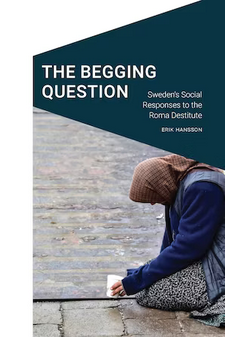

The Begging Question: Sweden’s Social Responses to the Roma Destitute
By Erik Hansson
Publisher: University of Nebraska Press
Recommended by Hélène B. Ducros
How do people emotionally and morally react to begging in European cities? Do they feel anxiety, discomfort, disbelief, empathy, compassion, shock, confusion, anger? For his latest book, The Begging Question: Sweden’s Social Responses to the Roma Destitute, human geographer Erik Hansson collected social media content, followed a non-governmental organization assisting homeless people, and interviewed residents in Sweden to identify how people encounter “the begging gesture” in everyday life in a country where until the 2010s people were not acquainted with that encounter. The originality of the book lies not only in the unexpected choice of Sweden as a case study but also in the way Hansson effects an analytical convergence of the field of psychoanalysis with social and historical criticism to engage in two foundational questions in his work: how is begging envisaged as a social problem in Sweden, and how is this problem taken up politically and psychologically in a country that understands itself as morally enlightened? As the author navigates the relationship between poverty and begging in the context of class-based capitalism and in the face of what he calls the “Swedish ideology” of moral exceptionalism, he addresses issues of anti-Roma racism vs. colorblindness, the criminalization of poverty vs. welfare schemes, housing markets and the role of civil society, universal human rights vs. national legal impediments to the application of these rights, the gaps between social citizenship and national citizenship, the social experience of “insiders” vs. that of “outsiders,” rural to urban cross-border mobility in the context of the EU’s freedom of movement, the role of the unconscious in shaping social policies, and ultimately the ways in which people, individually and collectively, process difference.
Through the innovative intersection of psychoanalysis and social criticism, Hansson’s book not only underscores the role of EU legislation in shaping the position and experiences of EU citizens who become homeless in member states other than their country of origin—specifically the Roma from Romania and Bulgaria, which are among the poorest nations in the EU—but also the ways in which member states may interpret this legislation in light of domestic social and political contexts, in turn triggering particular responses from their respective populations. Embarking on what he calls a “psychoanalytic critique of ideology” and drawing on Slavoj Žižek’s social theory and Stuart Hall’s views on hegemony, Hansson points to the history of inequality and pauperism in Europe through a critique of capitalism. Moreover, racism against the homeless and their Othering are captured in the term of “EU déclassés,” described as a position “held by impoverished vulnerable people from primarily the European Union’s poorest countries.” The author explains how the Roma have become Europe’s “internal Other,” often used as scapegoats for social woes and subjected to system-wide discrimination across the EU (including in Romania). Hansson makes the complex argument that the anxiety people in Sweden feel in their encounter with the begging act goes beyond their specific national context and beyond issues of poverty, criminalization, and Othering, as it also reflects the unconscious confrontation of “the desire of the Other,” in the Lacanian sense. When people anxiously conceptualize begging as a criminalized “expression of poverty,” what they encounter through the suffering of the officially coined “vulnerable EU citizens” who live on the margins of society, excluded from education, social, and health services, is humanity—others’ and their own. This brilliant and intense book is recommended for anyone conducting research on homelessness and urban poverty in general.
Published on July 12, 2023.




